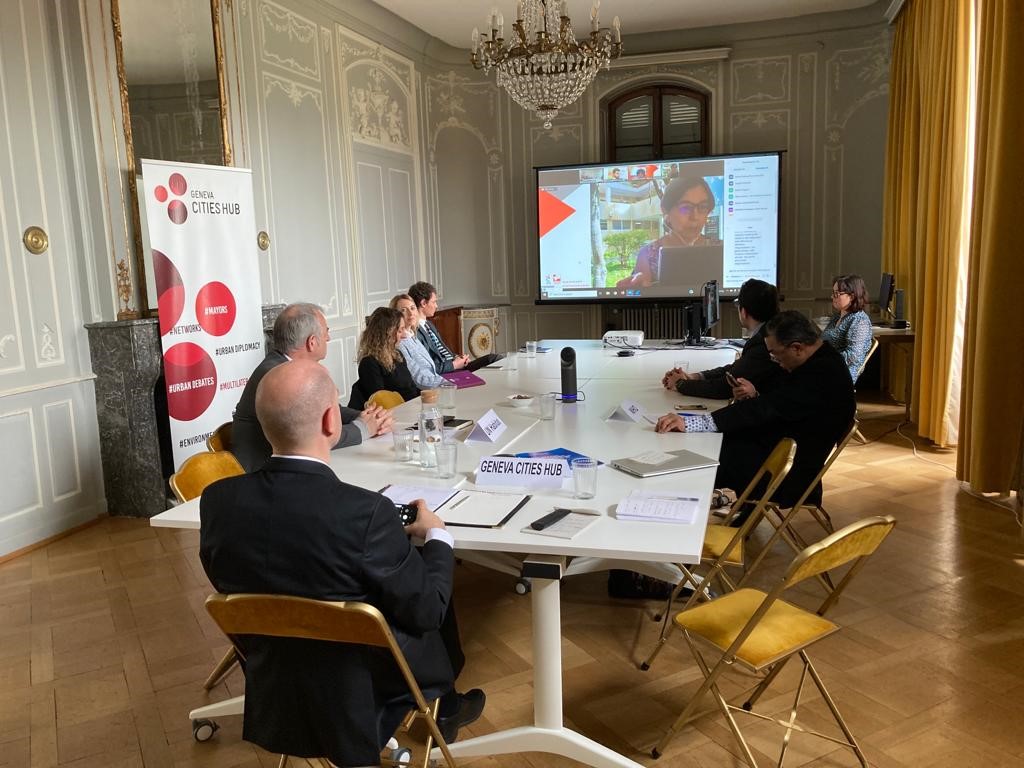On 16 March 2022, the Geneva Cities Hub organized, in partnership with UN-Habitat, a Geneva Urban Debate to bring to the fore the municipal experiences (Kigali-Rwanda, Madrid-Spain, Niterói-Brazil and Cali-Colombia) that were relevant for the next pandemic in terms of prevention, preparedness and response.
During the event, we heard recommendations to develop or revise policies to ensure better preparedness for future health emergencies:
- Prepare a more efficient and credible crisis communication strategy to avoid the dissemination of false and potentially harmful information.
- Involve from the beginning all stakeholders responsible for health protection, social assistance and economic recovery.
- Better harmonize local policies to avoid confusion of local population by different measures in place.
- Strengthen coordination among international, national and local actors.
- Establish a permanent monitoring and response mechanism to respond faster and in a more structured manner.
Recent massive urbanization has led cities to become epicentres of disease transmission. Infectious diseases like COVID-19, tuberculosis, dengue and diarrhoea thrive in poor and overcrowded environments and are closely related to unhealthy housing and poor sanitation and waste management. Given the fact that cities deal with many dimensions of health, they need to be involved not only in the response to pandemics but in the international debate on strengthening preparedness. Due to the proximity to their population, their knowledge and understanding of the local actors and context, cities are crucial to prevent, prepare for, and recover from health emergencies.
Mayors and vice-mayors from Kigali, Niterói and Madrid explained the complexity of a pandemic response, emphasizing its health protection, social assistance and economic recovery aspects. Dr. Mpabwanamaguru Merard, vice-mayor of Kigali, talked about the importance of local governments becoming the major source of information for citizens because nobody is safe until everybody is safe. Ms. Begoña Villacís Sanchez, deputy-mayor of Madrid, said that municipalities were the cornerstones of response in crises due to their proximity to citizens. We have learned from the deputy mayor about 105 transformative investments as part of a plan to make the city of Madrid more resilient in the future. Mr. Axel Grael, mayor of Niterói, advocated for better communication among cities to ensure that people are not confused by different information and local regulations. Participants agreed that Covid-19 had changed all aspects of our life, especially urban life.

WHO and UN-Habitat explained the ongoing efforts at the global level. Mr. Graham Alabaster, UN-Habitat Geneva Office chief, said that for successful efforts of pandemic preparedness and response we needed to harmonize the basic rules of emergency management. Ms. Nathalie Roebbel, head of unit at WHO, explained the numerous components of urban health and the need for the different entry points of social, environmental and economic policies to be connected at the international, national and local levels. Mr. Ludy Prapancha Suryantoro, head of unit at WHO, underlined that emergency preparedness requires a whole government – whole society approach. As such, he reminded that WHO in its resolution WHA73/8 of 2020 on strengthening preparedness for health emergencies included already the cities. Cities are central to pandemic preparedness and response, and international cities are becoming increasingly important from this point of view.
Mr. José Alvarez from UCLG described the important work carried out by his organization in cooperation with cities on health issues, in particular in keeping the multi-level conversation ongoing. Recently UCLG focused on the sharing of local experiences regarding the challenges of access to vaccines. The academic viewpoint was presented by Ms. Lyda Osorio from Universidad del Valle Cali, Colombia, who concentrated on the social determinants of health and the complexity of the pandemic response. She eloquently pointed out that local authorities needed to permanently adjust the primary goal of intervention – be it health protection, social assistance or economic recovery. Mr. Nicolas Gharbi, principal advisor at the city of Madrid, concluded by inviting all relevant stakeholders to advance city-to-city cooperation that proved to be crucial during the past pandemic, and enhance coordination among international, national and local actors.
This Geneva Urban Debate proved the importance of the municipal work to deal with the Covid-19 pandemic and the role of local authorities in preventing and responding to possible future pandemics. The involvement of several stakeholders brought to the fore important aspects of urban health, including pandemic preparedness and response. As Mr. Alabaster put it: “when the next pandemic comes to a city, the gravity of its effect will also depend on the overall urban health conditions”. Therefore, it is of utmost importance to enhance the inclusion of cities and local governments in intergovernmental debates held at WHO on pandemic preparedness and response.
Video
Watch the video of the event.


